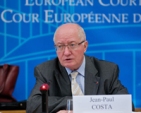Today the European Court of Human Rights officially makes the start of its 50th judicial year. The Court organizes a seminar for the occasion; it will be attended by two hundred and fifty eminent figures from the European judicial scene – international and national judges, Ministers of Justice, lawyers, etc. The seminar will be opened by Mr Jean-Paul Costa, President of the Court, and Dame Rosalyn Higgins, President of the International Court of Justice.

Photo: Jean-Paul Costa, President of the European Court.
Alongside this seminar the European Court has summarized its impact in 2008. According to the statistics available on the ECtHR web-page, the size of the current caseload is enormous (nearly 100 000 cases pending) and it is constantly increasing, the situation is aggravated by difficulties in reforming the ECtHR. The president of the Court reported that the Court had delivered 1,543 judgments in 2008, 3% up on 2007, and 30,163 decisions, 11% up. He also explained that this considerable activity had not reduced the backlog, as some 50,000 new applications had been allocated to a judicial formation in 2008, 20% more than in 2007.
He also pointed out that 57% of applications had been lodged against just four States (the Russian Federation, Turkey, Romania and Ukraine), with the remaining 43% covering the other 43 Member States.
In recent years the European Court has greatly contributed to the struggle with torture application in Russia. Here one of the most important judgments is still the judgment under the case “Mikheyev vs. Russia” delivered on 26 January 2006. The Court unanimously held that Alexey Mikheyev had been tortured while being detained in one of Nizhny Novgorod police stations, and that the Nizhny Novgorod prosecutor’s office had not conducted an effective investigation under that case. Mikheyev was awarded a record compensation for similar cases – 250 thousand euro.
In 2008 the ECtHR delivered several judgments under applications coming from Russia in connection with police abuse. These are cases of Olga Maslova and Fyodor Nalbandov from Nizhny Novgorod, Vladimir Barabanschikov from Lipetsk region, Oleg Nikitin from Ivanovo, Evgeniy Chember from Rostov region, Akulin and Babich from Moscow.
We would like to underline that after the case law judgment under Mikheyev’s case, the Prosecutor’s office finally conducted investigations under several torture cases which resulted in conviction of perpetrators. More and more often Russian courts award adequate compensations of moral damage to victims of tortures, inhuman or degrading treatment referring to international standards and European Court judgments.
However, Russian authorities are still reluctant to take serious steps in order to eradicate tortures and improve the quality of investigations under such cases. The Committee against Torture practice shows that the Prosecutor’s office staff violates the rights of applicants and victims on a regular basis; investigations they conduct do not comply with the effectiveness standards set out by the Strasbourg Court. And Prosecutor’s office heads do not show and striving to improve the situation.
Here you can find the statistics of the ECtHR for 2008.